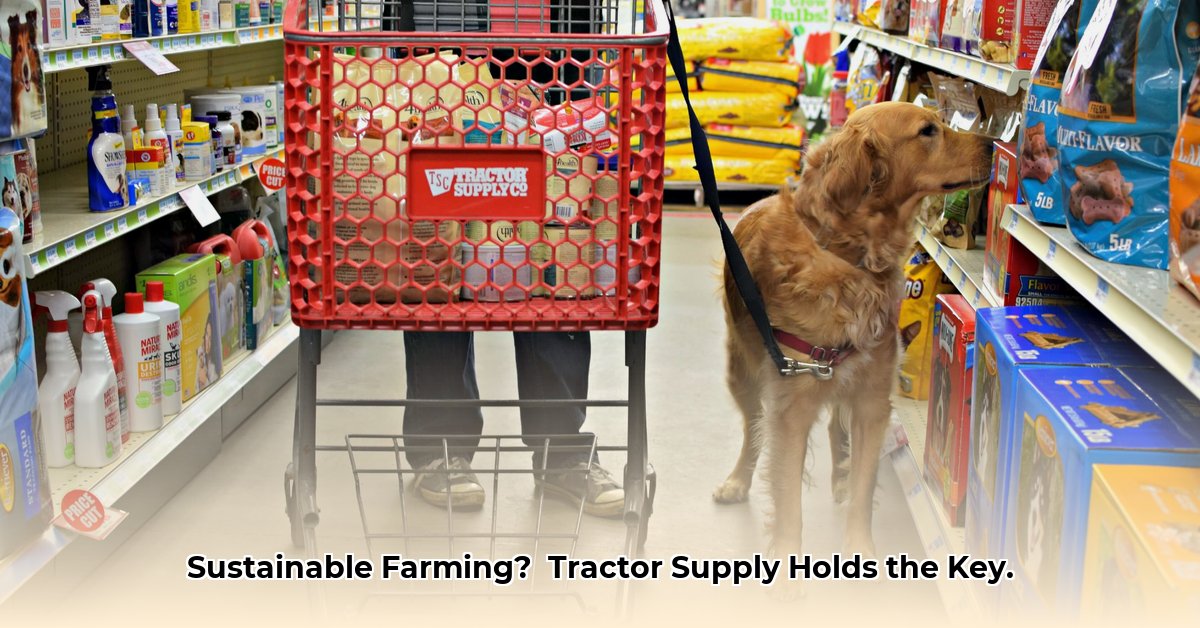
Tractor Supply's Role in Sustainable Agriculture: A Case Study
Tractor Supply Company (TSC) occupies a unique position within the agricultural landscape. While not overtly positioned as a sustainability leader, its extensive network of stores and wide product range indirectly influence the adoption of sustainable farming practices. This case study examines TSC's contribution to sustainable agriculture, exploring both its strengths and areas needing improvement. Our analysis reveals that while TSC provides crucial resources for sustainable farming, greater transparency and proactive sustainability initiatives are needed to fully harness its potential. For more information on TSC's pet food offerings, visit the Sportmix site.
TSC's Product Offerings and Sustainable Agriculture
TSC offers a diverse array of products that directly support sustainable farming practices. For example, durable fencing helps prevent overgrazing and soil erosion, contributing to land preservation. Efficient watering systems, such as drip irrigation and livestock waterers, minimize water waste—a critical resource in agriculture. The availability of organic seeds and soil amendments empowers farmers to reduce or eliminate reliance on harmful synthetic chemicals. Furthermore, TSC's selection of livestock feed options often prioritizes animal health, leading to less disease and reduced reliance on medication—factors contributing to a smaller environmental footprint. These everyday products, readily accessible to farmers, constitute tangible building blocks of sustainable farming.
Analysis of TSC's Sustainability Efforts
While TSC indirectly supports sustainable agriculture through its product offerings, its own direct sustainability efforts require further scrutiny. Currently, a lack of transparency regarding TSC's supply chain practices, carbon footprint, and ethical sourcing hinders a complete evaluation of its overall sustainability performance. While the company's product offerings undeniably contribute to sustainable agriculture, a more comprehensive and publicly available sustainability report is crucial for a complete and unbiased assessment. This lack of data prevents a robust evaluation of TSC's total impact, highlighting a critical area for improvement.
Stakeholder Analysis: Shared Responsibility for Sustainable Farming
Sustainable agriculture necessitates a collaborative effort involving multiple stakeholders. TSC plays a vital role as a key supplier, but farmers, consumers, and government agencies also have essential responsibilities.
- Tractor Supply Company: TSC needs to increase transparency regarding its sustainability initiatives, expand its offerings of eco-friendly products, and actively promote sustainable farming practices among its customer base. A robust sustainability report detailing its carbon footprint, supply chain practices, and ethical sourcing policies is needed.
- Farmers: Farmers need to actively adopt and implement sustainable farming techniques, making informed choices about the products they purchase from TSC and other providers. This includes utilizing tools and resources promoting efficient water usage, soil conservation, and reduced chemical applications.
- Consumers: Consumers can influence the market by actively seeking out sustainably produced foods and supporting businesses dedicated to environmentally responsible practices. Increased demand for transparency and sustainable practices from retailers and producers will encourage further improvements.
- Government Agencies: Government bodies should actively support farmers by implementing policies that incentivize sustainable agricultural practices. This may include financial incentives, tax breaks, or grants promoting the adoption of sustainable methods. Additionally, clear and consistent regulations can help ensure that sustainable practices are implemented effectively across the sector.
Recommendations and Future Outlook
To foster a more sustainable agricultural future, concrete actions are necessary. TSC should conduct a thorough sustainability audit, improve the transparency of its operations, and significantly expand its range of eco-friendly products. Farmers should prioritize the adoption of sustainable practices, using the resources available through TSC and other avenues. Consumers should actively support businesses committed to environmental stewardship. Finally, government agencies must offer strong policy support, encompassing financial incentives and educational programs focused on sustainable agriculture. The combined efforts of these key stakeholders are crucial for building a truly sustainable agricultural system.
Conclusion
Tractor Supply Company's role in sustainable agriculture is complex. While its product offerings significantly contribute to the adoption of sustainable methods by farmers, the company's own sustainability performance requires greater transparency and proactive engagement. The future of sustainable agriculture depends on collaborative efforts from all stakeholders—TSC, farmers, consumers, and government agencies—working together to establish a more resilient and environmentally responsible agricultural system. The potential for positive change is significant if we prioritize transparency, accountability, and a commitment to environmentally responsible practices across the board.